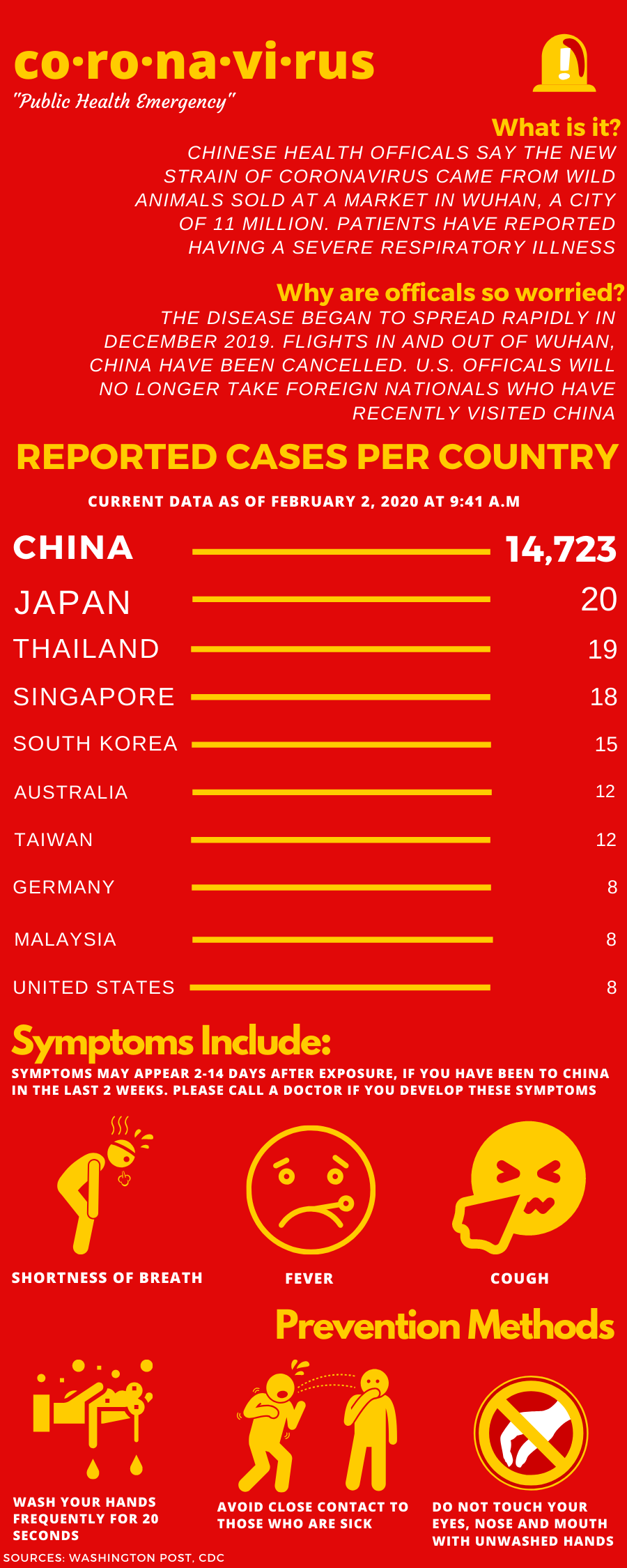Graphic: Maggie Claytor/ The Johnsonian
Influenza season is at its peak during the winter, causing many to become sick with the virus. However, there is a new strain of sickness that has made its way around the world and has scared many — the coronavirus.
The novel coronavirus causes infection in the upper throat, nose and sinuses. It was first identified in the 1960s and its origin is unknown, according to Science Alert. Less than 70 years later, another outbreak has sparked in China.
Similar to the common cold, symptoms can include coughing, fever, sore throat and runny nose. It may even cause ear infections in children.
“The common cold and the coronavirus have very similar symptoms,” Bethany Wise, a sophomore biology major, said. “That is what makes this new virus so scary because if it goes misdiagnosed then the symptoms could develop into something much worse than the common cold.”
In some cases, infected patients may not even show symptoms, making it even more difficult to distinguish between a simple cold and the virus. People with strong immune systems can fight off the illness just like a cold, while it can be fatal to others, according to WebMD.
Wise researches bacteriophages, viruses that infect bacteria, which could be used as a form of medical treatment if the coronavirus is a bacterial strain of infection.
“If the specific strain of coronavirus was bacterial, then that is where phages could potentially eradicate the bacterial infection through a new medicinal practice called phage therapy,” Wise said. “This is so because bacteriophages are viruses … that kill bacterial cells. As far as I know, this method of therapy has not been used on anybody with a bacterial case of coronavirus.”
So far, there are at least 250 deaths because of the virus, and about 12,000 cases confirmed, according to the New York Times. Because of the quickly spreading disease, almost 60 million people have been under lockdown in China for a week. If a person on campus was infected with the virus, Winthrop’s Health Services has methods to reduce the spread of the virus.
“We ask any student coming into Health Services if they have traveled recently and where the travel took them. [As well as] if they have had any potential known exposure to anyone that has traveled abroad,” Mary Barreto, the assistant director of Winthrop Health Services, said. “The incubation is 2 to 14 days. If we had a student that developed symptoms and had been to Wuhan or exposed to someone who had been to Wuhan, we would isolate that patient, contact DHEC and take appropriate measures with DHEC guidance. The campus community would be notified.”
The World Health Organization has declared the coronavirus a global health emergency. However, there are preventative measures that can be taken to reduce the chances of getting the virus.
“The best way to prevent the transmission of this disease is to constantly wash your hands, refrain from touching your face and take caution when drinking after others,” Wise said. “It’s also important to wash your hands after touching public items that are used daily, such as door knobs and handrails on staircases.”
The coronavirus isn’t the only disease that’s spreading quickly — the flu is showing an increase on campus.
“Since we have been back from winter break we have seen 11 students with the flu or a flu like illness,” Barreto said. ”We do not see all the student body so I am sure there is more on campus. As you read in the news, the flu is widespread.”
Students can use preventative methods to reduce or avoid the contracting of the flu.
“The first recommendation is to get an annual flu vaccine. The vaccine takes 2 weeks to become effective but may help during this flu season. Second is to use good, frequent handwashing [and] do not touch [the] eyes, mouth [and] nose,” Barreto said. “[As well as keeping] their immune system strong by eating healthy [and] getting enough rest.”’
Graphic: Shaniah Garrick





